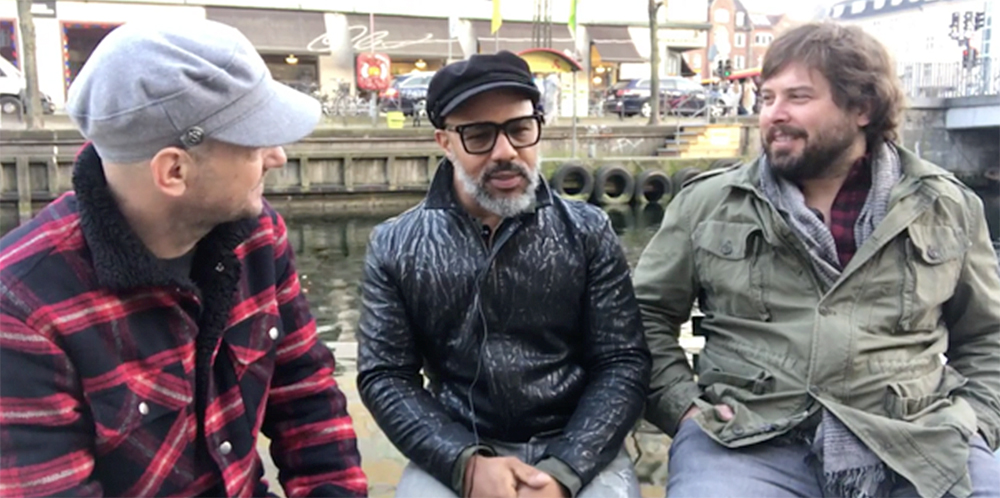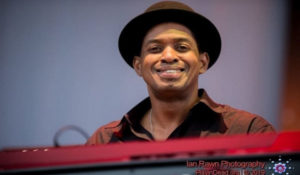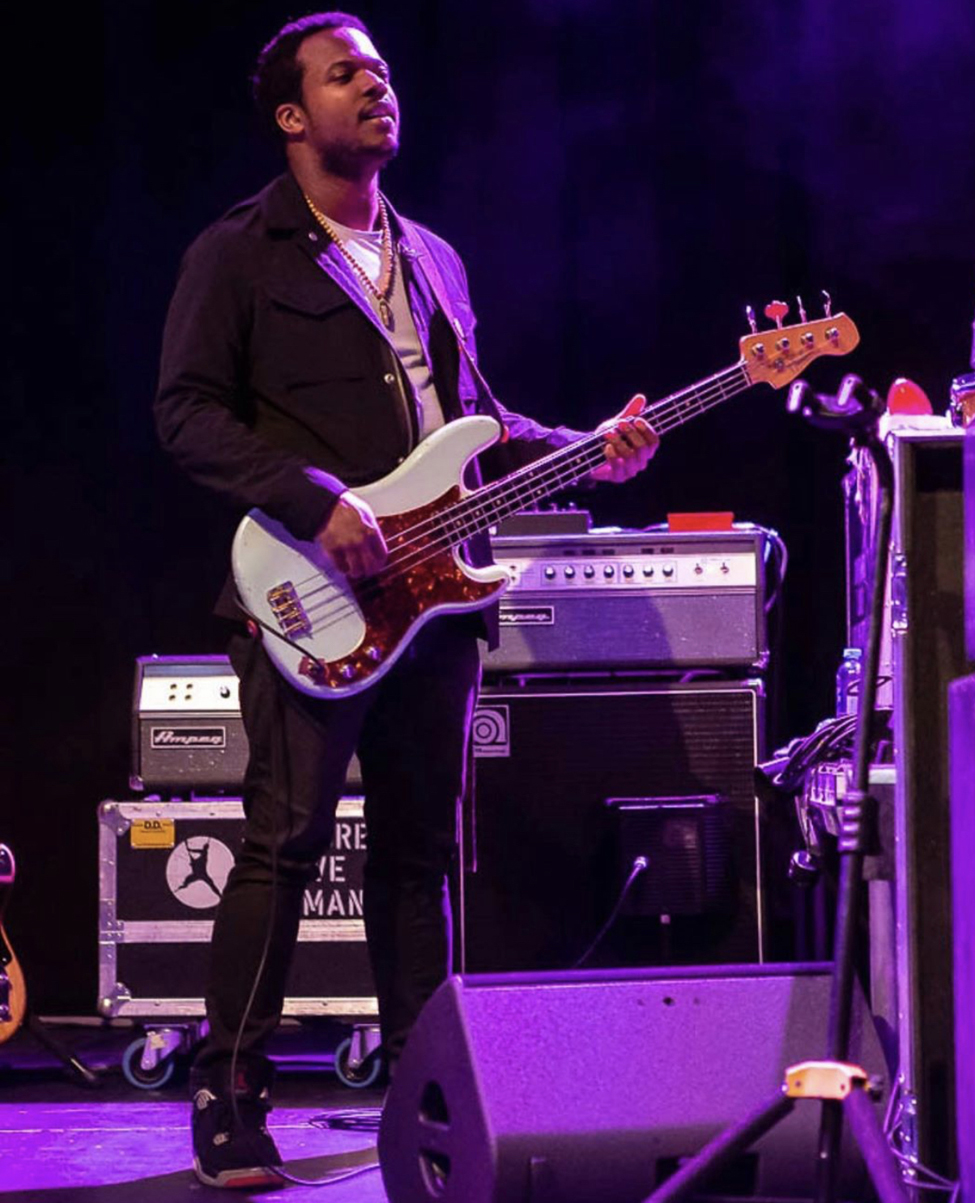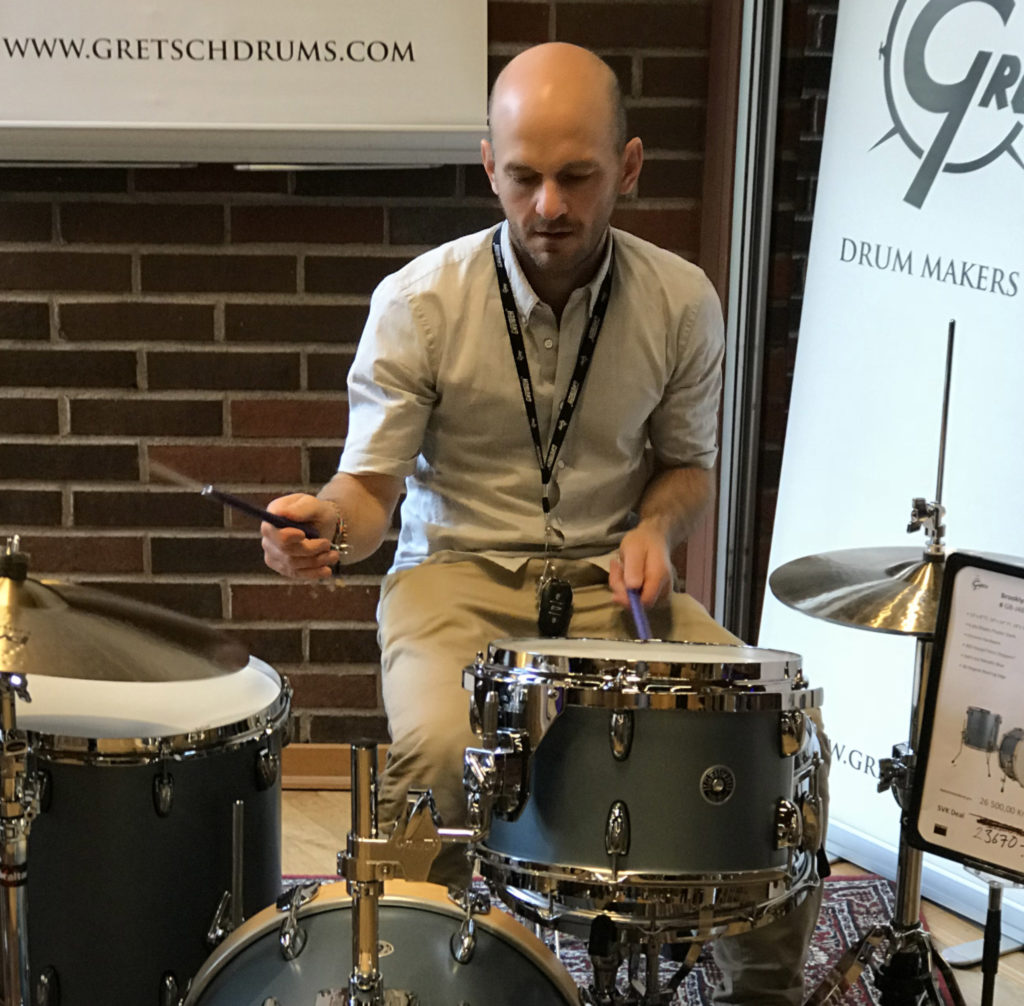A Gretsch Abroad–Exclusive Interview with Tedeschi Trucks Band Drummers Greenwell & Johnson – Part II
Tedeschi Trucks Band drummers Tyler Greenwell and J.J. Johnson on the magic of double drumming, the loss of Kofi Burbridge, and life on the road away from family.

Lucas, J.J., and Tyler.
Part II:
Lucas: You guys are coming off of a tragic loss with the recent death of your keyboard player Kofi Burbridge in February 2018. Can you talk about how the band is dealing with that and how you are dealing with that on a personal level?

Kofi Burbridge. Photo: Ian Rawn.
Tyler: I think everyone is dealing with it in their own way. The band as a whole is dealing with it by trudging forward and playing through the loss. That was a big hit to us personally and musically. Kofi has been around this family and this organization for a long time, having worked with Derek for almost 20 years. He was the glue of this band. Again we talk about patience and what you are not doing, with Kofi it was more of what you didn’t hear, it was the subtle stuff he was doing that helped make this band what it has become. Kofi was a true musical genius.
J.J.: …and that is not using the term loosely.
Tyler: A modern day musical genius. A world-class flutist. A world-class keyboardist and composer. From an early age his teachers knew he was a special human being. They supported him and sent him off into the world to study and become the great man that we got to know and play with. He was cut from a different cloth musically. He wasn’t grounded in this world. He was in the ether, he was on a whole other plane. Everything was music to him. He slept, ate, and breathed music daily. I’d wake up sometimes at five in the morning in my bunk and we would be working on his keyboard. He worked relentlessly. Writing, arranging, composing.
J.J.: Without broadcasting, he just had tons and tons of ideas, and I’ve probably only heard a fraction of them.
Tyler: He was one of those incredible musicians, I’m sure the drumming community understands this, you play with certain people in your life and no matter what you are playing, they will always make it sound legit. He always made you sound better. Whatever he played always complemented what you were playing.
J.J.: Well it’s like back to the double drumming thing. He never forced anything. He lifted any situation, and he would do these moves where it was like “woooo” and with him it was like “woooo” all the time. We would be in the middle of something and he would just bring this lightning bolt into the song with some progression, change or motif. It never failed, and it was never anything that was over thought, he was just such a deep listener.
Tyler: It was pure instinct combined with an amazing amount of facility. True practice and knowledge. So it wasn’t just this random instinctual beauty, it was a combination of years and years of serious practice. Plus the perfect instinctual moves always.
Lucas: So when he passed and you had all these gigs lined up, what happened?
J.J.: It was pretty daunting.
Tyler: We all got together and talked about what we should do, if we should cancel the tour and so forth. We thought about what Kofi would want and he would definitely want us to go out and play, so we decided to play. That’s what he was, he was pure music. It was cathartic and it was good for us to do that.
J.J.: But it was definitely challenging. We were really early in on this tour. An hour before we had to play we learned of his passing.
Lucas: How was it having to play that night?
Tyler: I have no idea.
J.J.: That was definitely one of the hardest nights of music I had to play. We were in Washington D.C. which, ironically enough, is where Kofi grew up. Everybody did great considering the circumstance. Everybody pulled through that night and entertained the audience.
Tyler: All the people at the show were die hard fans so the word was out. Everyone knew. All of these folks had been lifelong fans of Kofi, and we were playing in his hometown. It was an intense experience. We loved him dearly and we always will.
J.J.: He was just such a beautiful individual all around. I am reminded of him on a daily basis. That smile, the laugh, the way he was open and available to people. There were things I learned from him just by observing him. I’d show up and be grumpy about something and I’d see him and I would be out of place with my grumpiness. He wouldn’t have to say anything to me but just by observing him and seeing how his spirit is and his outlook on things, I was just like CHECK.
Lucas: That’s what a professional does.
J.J.: Yep, leading by example.
Lucas: He was like ten years older than you guys so he was like a big brother type of figure.
Tyler: Absolutely. To everyone. He was the older statesman, he had been around.

Bassist Brandon Boone.
Lucas: Can you guys talk about your new bassist Brandon Boone?
Tyler: Brandon was born and raised in Augusta, Georgia and had lived in Atlanta. Derek had a relationship with a guy called Colonel Bruce Hampton and Brandon had gone through Bruce’s camp, he had played with Bruce. So there was this whole southern contingent of musicians who had played with this guy. Brandon had been in that school. We were looking for guys who had kind of been in that world and understood what the band was about, and what we were looking for in a bass player. Brandon was a radically-talented young bass player who had played with Bruce. He came down for a rehearsal and learned a dozen or so tunes. You know usually those things are pretty immediate when you’re trying to see if you connect with a musician. You almost always know right away, and this wasn’t any different. Everyone agreed that Brandon was the right guy. I remember me and J.J. looking at each other in the first or second tune and nodding.
J.J.: It was undeniable. He was the first guy who we looked at and he really left an impression. There was something special about his contributions. Everything about him. Great demeanor, extremely prepared, but he also interjected a little of himself and brought in small changes that were a step up, so it was like “wow!” He wasn’t just coming in and trying to be like the last guy.
Lucas: Let’s talk a little bit about the work/family balance. You guys each have three kids. Isn’t it difficult to be working in a creative realm and also to be a good parent at the same time? I feel like in the creative realm you are supposed to do things like take chances, think outside of the box, take risks, all of these you are not supposed to do as a parent. I mean as a parent you are definitely not supposed to take risks, you’re supposed to create a level of stability and safety. So isn’t it hard to work in the creative realm and also play the role of a good parent, or what modern western society considers to be a good parent?
J.J.: It’s a little bit tough, but what I’ve come to find is that there is no defined idea of that. So looking at other musician parents I know some of them have a classic conservative style of parenting, while others are the complete opposite who have great results. Kids that are really sharp and engaging and really mature for their age. A very non-traditional sort of upbringing. The hardest part is just being gone all the time, because you can’t really make that up again. These days with technology you can be a lot more connected with Facetime and so forth, or you can have them come out with you on tour for a bit, but it never really makes up for all that time that you are gone. Trying to explain it to a kid isn’t always easy. They don’t have the constitution to fully understand it, they just know that you’re gone all the time. It’s the transitioning that is kind of an obstacle, both when you are coming and going. There’s the anxiety when you are about to leave. Like “Daddy, I don’t want you to leave.” I’m like “Well, I don’t want to leave you either but this is what your dad does,” and that’s heartbreaking shit. People often don’t talk about the repercussions of this lifestyle. My daughters are adults now in their twenties but it affected them and it affected our relationship. Their mother and I were separated so there was already this degree of separation, but then on top of that I was touring all of the time, so I wasn’t there every day. There’s a level of resentment that comes with that. As much as I tried my best to show up, they weren’t receiving it that way. They were like “You missed this, you missed that.” My bandmates also have kids with important days in their lives, so I can’t just say “Hey, I can’t play the concert at Madison Square Garden because it’s my daughter’s birthday.” Everybody has to give up something a little bit.
Tyler: If it wasn’t for my wife, and if it wasn’t for Sarah (J.J.’s children’s mother) it would be bad.

December 2, 2019 – The Tedeschi Trucks Band in concert. Photo: Stuart Levine.
J.J.: Our children’s moms do a lot of the work, and they deserve all the reverence for the things that we are not there for. I am grateful for that. My children are beautiful and well balanced people. As my daughters have become adults, its amazing to see. There’s maybe a little bit of influence that I’ve had, but you know. We know what the deal is, while we’re out working and doing our part, the moms are there dealing with the great days and the not-so-great days.
Tyler: Families are amazing and they have to take up the slack. That’s the only way we have been able to do this for as long as we have been doing this. On the road for twenty years. It is who we are and everyone has known that for a very long time and that’s the trajectory. It’s the people who have your back that nobody ever hears about that makes this possible. Any musician who has kids knows what we are talking about here. Especially with the children, that’s the hardest part. Thank you, Paulette, I love you, you are a babe!
— Lucas von Gretsch
(Gretsch Generation 5)

Follow Lucas on Twitter or send him an mail at lucas@gretsch.com
Enjoy Part 1 of this interview.
Spotlight photos by Mark Lowenstein.



 Previous
Previous